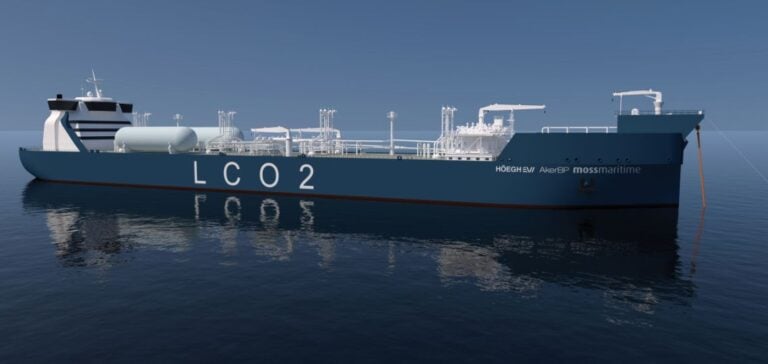Höegh Evi and Aker BP have announced they have received an Approval in Principle (AiP) from DNV for a new type of vessel specialised in the transport of liquefied carbon dioxide (LCO₂). The vessel is intended to link European industrial emitters with geological storage sites on the Norwegian Continental Shelf.
The project, developed in collaboration with Norwegian engineering company Moss Maritime, marks a milestone in building a complete logistics chain for Carbon Capture and Storage (CCS). DNV’s assessment covered the entire vessel design, including its onboard CO₂ conditioning module. It is the first vessel to be validated under DNV’s new CO2 RECOND class notation, created specifically for CO₂ handling and transportation systems.
An integrated solution for carbon logistics
The approved vessel is designed to integrate CO₂ conditioning and offloading operations, simplifying logistics, avoiding impurity cross-contamination between industrial sources, and enabling direct injection into subsea reservoirs. Two approved variants of the model offer capacities of up to 50,000 m³ of liquefied CO₂.
This development is part of the CCS offering from Höegh Evi and Aker BP, targeting the EXL 005 Poseidon and EXL 011 Atlas sites, both operated by Aker BP on the Norwegian Continental Shelf. The infrastructure is initially sized to manage up to 10mn tonnes of CO₂ annually, with potential scalability depending on market demand.
Towards a new maritime standard for CO₂ transport
The project has been acknowledged by stakeholders for its collaborative approach. According to Nils Jakob Hasle, Executive Vice President for Clean Energy at Höegh Evi, this progress represents “a key technical solution for realising our large-scale CCS offering.” Ørjan Jentoft, Asset Manager for CCS at Aker BP, emphasised the aim to “develop large-scale storage solutions on the Norwegian shelf by leveraging the group’s upstream expertise.”
DNV stated that the approval demonstrates how its new classification can support the development of safe and efficient solutions for offshore CO₂ transport and injection. The operator expects this new generation of vessels to play a decisive role in establishing European-scale CCS infrastructure.






















